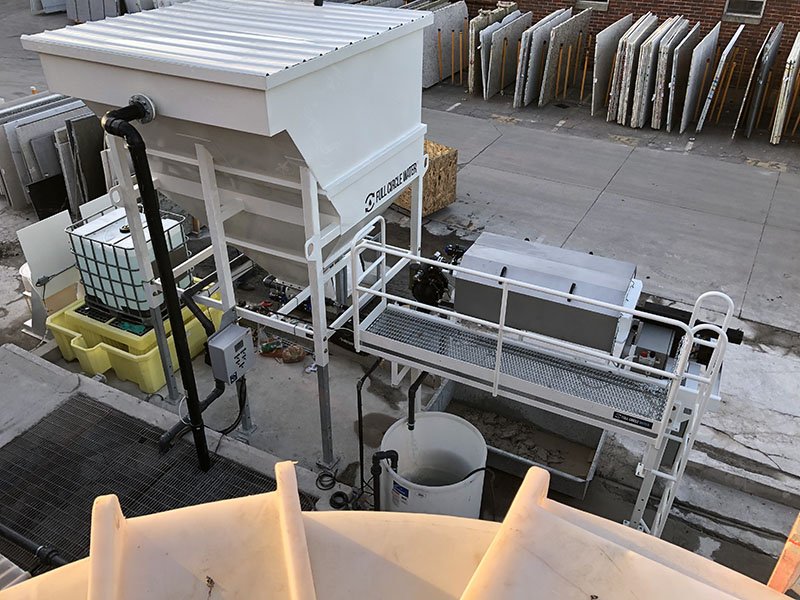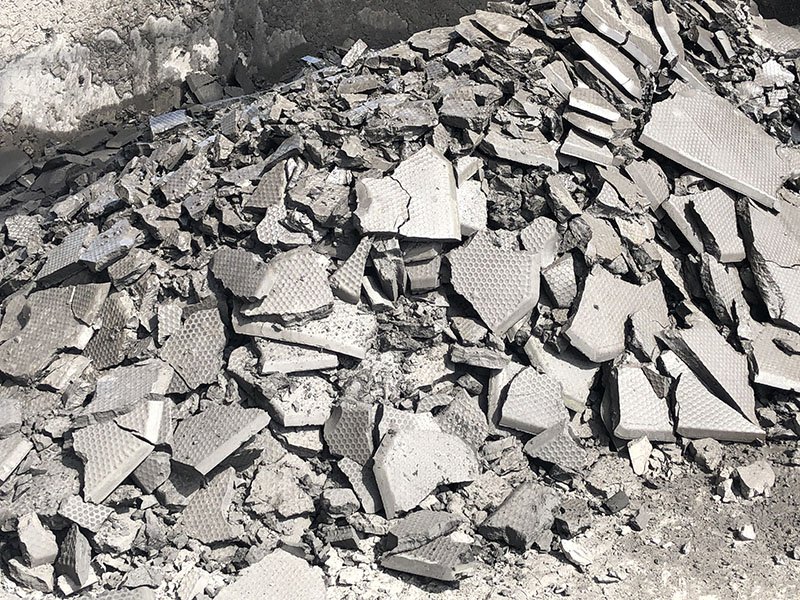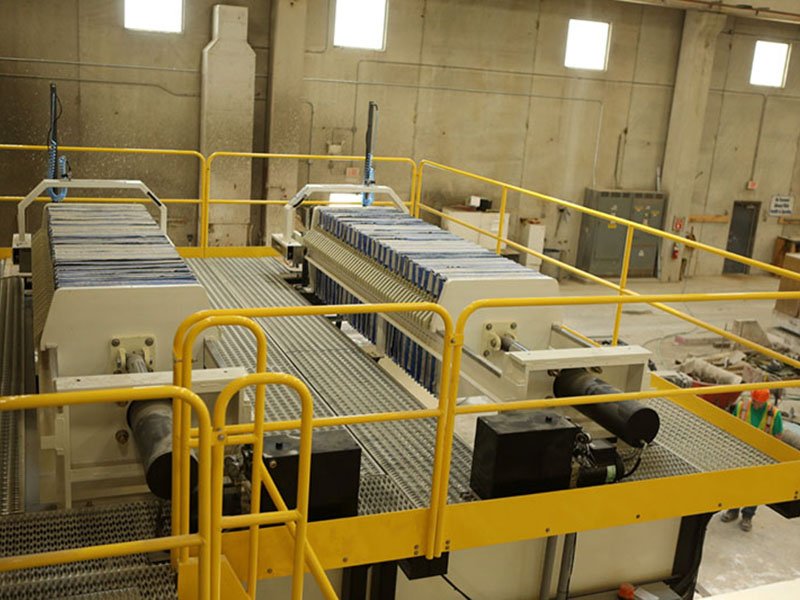
Needing Help With Your Slurry
Our team will work diligently to make sure all your slurry problems are solved.
Full Circle Water has thousands of satisfied clients throughout North America
We manufacture equipment right here in St Joseph, MN. We are family owned and believe you should be demanding of the equipment we manufacture.
Solutions for Stone
The stone industry provides a unique wastewater challenge. Different types of stone each have characteristics that present differently in slurry. The equipment mix, the type of stone, and the way the equipment is used can all make a difference in the volume of suspended solids in your wastewater. Stone, granite, and glass fabrication shops around the country must follow a long list of regulations, laws, and ordinances coming at the federal, state, and local levels. That means fabricators need an equipment solution that targets the large concentration of suspended solids in slurry. Suspended solids can be incredibly small, which requires a specific settling process that takes into consideration the size of the solid and its particular gravity.
At Full Circle Water, we understand the need to provide solutions for unique operations and equally unique wastewater challenges. That is why we offer wastewater solutions from the filter press to the slurry silo system. While many other manufacturers provide only one wastewater solution, we have a whole range of products that can be customized to fit your needs.
With Full Circle Water equipment in your stone, granite, and glass fabrication shops, water recycling is made easy. Our products allow for water reuse, which not only helps you meet federal, state, and local regulations, but it can significantly lower your water use and your water costs. This also makes your shop an attractive option for consumers on the hunt for an eco-friendly shop.
Equipment specifications in the stone industry require suspended solids of a certain size to be removed. The equipment can be fragile, which means that if suspended solids are still in the water that is reused, there can be problems with clogging. This can lead to issues with pumps, trenches and pits, nozzles, hoses, and more. Stones can also become tarnished. Combining suspended solids with a high pH level can also lead to issues, such as corrosion of metal parts. Finding equipment that takes all of these factors into account is vital.
The stone industry typically utilizes our rotary vacuum drums, filter presses, silo systems, and all-in-ones. Filter presses and rotary vacuum drums are typically utilized in smaller countertop shops and in shops that do a large volume of CNC work and polishing. Larger countertop shops will often utilize a silo or rapid settlement system along with a filter press or bag filter system for their CNC machines and polishing equipment. Saw shops and quarries tend to utilize a silo or rapid settlement system to handle the large quantities of sludge produced.
Issues with Recycling
In stone industry water suspended solids of a certain size must be removed from the recycled water due to equipment specification (saws can use straight slurry water; cnc’s need very clean water). Suspended solids also cause premature pump failure, equipment and piping clogs, and issues with trenches and pits. Suspended solids also tarnish the polish of stone surfaces (most firms find polishing with water over a certain micron rating causes finish issues on the product surface. All equipment life and reliability is affected (pumps, nozzles, hoses and components wear faster in environments with suspended solids).
An emerging issue in stone industry water is long term corrosion of metal components from a combination of pH levels and other substances (alkalinity, hardness, dissolved solids, temperature, etc) in the recycled water. This is exacerbated by chlorination – which is particularly harmful to metal surfaces on your equipment. A good solution for your stone water recycling will take corrosion into consideration.
Full Circle Water offers a complete line of industrial wastewater products to meet your specific stone, glass, and granite water treatment needs. Many of our clients are interested in what makes each type of wastewater treatment equipment different so we’ve added the following information to give a brief explanation of the most widely accepted methods of treating sludge water. The stone industry presents unique challenges in filtering and recycling water.
Filter presses
(also known as plate and frame presses) are used in stone, glass, and granite water and wastewater treatment systems to normally dry sludge that has a high water content. They have also been used in the stone industry for treating slurry water. They typically operate with a pneumatic diaphragm pump pumping slurry from a pit into the press. The press has numerous plates (each of which has a plastic outer frame and a filter cloth interior) that are held together under about 5000 lbs of pressure. Slurry water is pumped through the press and the filter cloth collects a large majority of the sludge in the water. As the press fills with sludge the pumping rate slows down and eventually the backpressure on the press stops the pump from pumping. At this point or before on a prescheduled basis the shop opens the hydraulic ram and cleans the plates off. Depending on the size of the press and the sludge volume this can take between 45 minutes and 3 hours. Presses come in a variety of sizes and are rated in cubic feet of mud capacity.
Presses require filter cloth replacement on a semi-regular basis depending on the material being filtered and the employee cleaning the plates. Presses are known for producing consistently good quality of water typically in the 1 to 5 micron range. Presses do require a larger amount of storage of clean water and frequent cleanings
Rotary Vacuum Drum
filters utilize a slowly moving drum surface to filter sludge out of the water. They are known for producing very clean water and dry sludge – but do so at a higher cost and at a slow rate. The drum rotates on a horizontal axis – usually partially submerged in the slurry water to be filtered. A vacuum sucks the slurry through the drum surface where the sludge that is too large to make it through is filtered. The remaining water passed through to a clean water tank or pit. As solids build up on the outside of the drum they are scraped off by a blade and fall into a cart for easy disposal.
Vacuum drum filters require a chemical treatment process to build a filter layer on the drum surface prior to treating the water. This usually is done daily by an employee. The costs to operate a vacuum drum include the chemical to build the filter layer, the time of the employee to do it, a higher amount of electricity than other methods of sludge removal, and the maintenance on many moving parts. Vacuum drums do deliver clean water at about 1 micron on a consistent basis.
Silo systems
are widely used to cost effectively treat high volumes of slurry water. Silo systems utilize settling instead of filtration to do this. They can deliver very clean water but require chemicals to do so. They can work without chemical settling agents or can use a large amount of chemical agents depending on the volume of sludge and the clarity of water needed. They are comprised of a large tank anywhere from 1000 gallons to 20,000 gallons (sized according to solids and volume based on settling rates of the slurry) – a pump to pump slurry into the system and a method of removing the solids collected from the bottom of the silo – typically this is done with a dumping valve or a pump. The sludge removed will be more wet than from a press or vacuum drum and can be further processed if needed by drying outdoors or by running through a press or large cloth sack to remove excess water. The advantages of a silo system are in the quantity of slurry water that can be treated in a given amount of time and in hands free operation. The disadvantage is a wetter sludge collected.
All In Ones and Rapid Settlement Systems
are similar to silo systems but utilize multiple plates and surfaces along with fluid dynamics to effectively reduce the amount of time needed to settle suspended solids (sludge) out of slurry water. They can be sized from a few hundred gallons and a handful of plates to thousands of gallons and hundreds of plates. Rapid settlement systems utilize an automated dumping mechanism to purge sludge settled out of the system into a large weeping bag filter. As with the silo system rapid settling systems can be utilized without chemical settling agents or can be used with them to promote faster settling and smaller equipment for the specific application. The advantage of these systems is the small footprint as opposed to a silo system and they can be much smaller in size and treat a larger amount of water than a typical silo system. They produce similar mud to a silo system and can utilize small filter presses to dry the mud further if needed.
In the stone industry filter presses and rotary vacuum drums are typically utilized in smaller countertop shops and in shops that do a large volume of cnc work and polishing. Larger countertop shops will often utilize a silo or rapid settlement system along with a filter press or bag filter system for their cnc’s and polishing equipment. Saw shops and quarries tend to utilize a silo or rapid settlement system to handle the large quantities of sludge produced.





